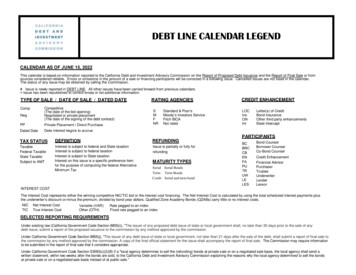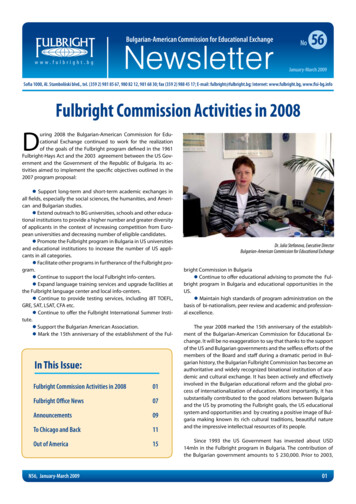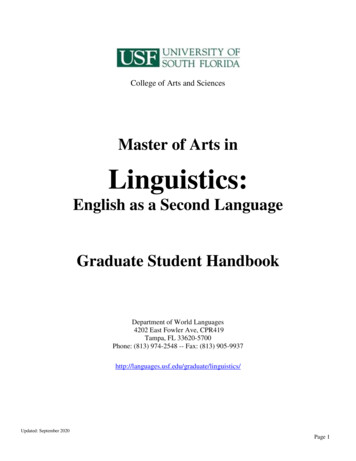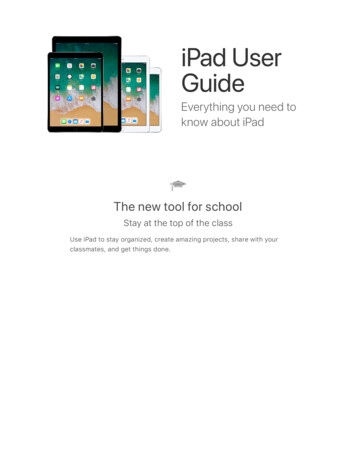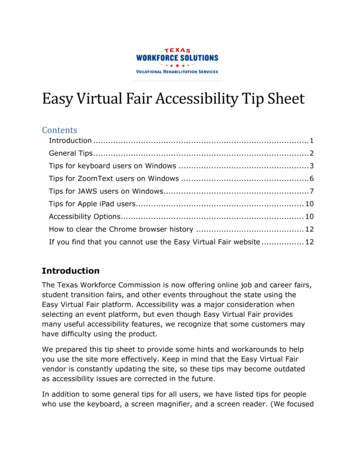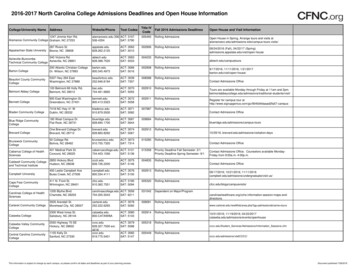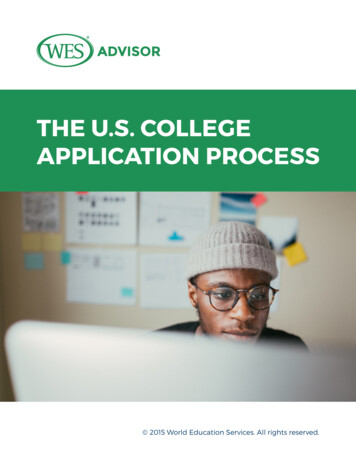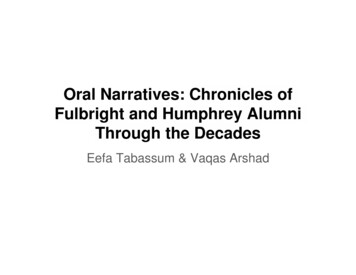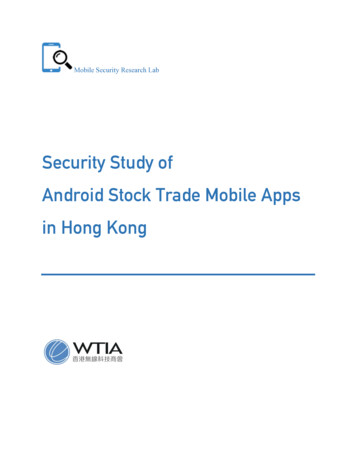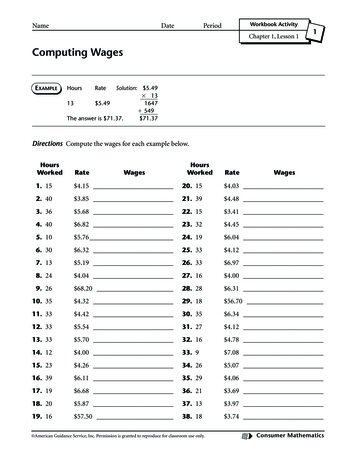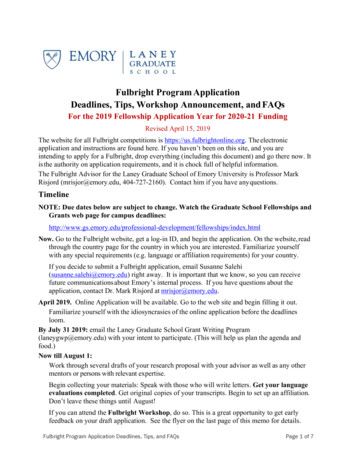
Transcription
Fulbright Program ApplicationDeadlines, Tips, Workshop Announcement, and FAQsFor the 2019 Fellowship Application Year for 2020-21 FundingRevised April 15, 2019The website for all Fulbright competitions is https://us.fulbrightonline.org. The electronicapplication and instructions are found here. If you haven’t been on this site, and you areintending to apply for a Fulbright, drop everything (including this document) and go there now. Itis the authority on application requirements, and it is chock full of helpful information.The Fulbright Advisor for the Laney Graduate School of Emory University is Professor MarkRisjord (mrisjor@emory.edu, 404-727-2160). Contact him if you have any questions.TimelineNOTE: Due dates below are subject to change. Watch the Graduate School Fellowships andGrants web page for campus elopment/fellowships/index.htmlNow. Go to the Fulbright website, get a log-in ID, and begin the application. On the website, readthrough the country page for the country in which you are interested. Familiarize yourselfwith any special requirements (e.g. language or affiliation requirements) for your country.If you decide to submit a Fulbright application, email Susanne Salehi(susanne.salehi@emory.edu) right away. It is important that we know, so you can receivefuture communications about Emory’s internal process. If you have questions about theapplication, contact Dr. Mark Risjord at mrisjor@emory.edu.April 2019. Online Application will be available. Go to the web site and begin filling it out.Familiarize yourself with the idiosyncrasies of the online application before the deadlinesloom.By July 31 2019: email the Laney Graduate School Grant Writing Program(laneygwp@emory.edu) with your intent to participate. (This will help us plan the agenda andfood.)Now till August 1:Work through several drafts of your research proposal with your advisor as well as any othermentors or persons with relevant expertise.Begin collecting your materials: Speak with those who will write letters. Get your languageevaluations completed. Get original copies of your transcripts. Begin to set up an affiliation.Don’t leave these things until August!If you can attend the Fulbright Workshop, do so. This is a great opportunity to get earlyfeedback on your draft application. See the flyer on the last page of this memo for details.Fulbright Program Application Deadlines, Tips, and FAQsPage 1 of 7
Sunday, August 4, 11:30PM: Materials for the Fulbright workshop are due. Please go to the GrantWriting Program website, and follow the instructions there. Materials will be redistributed to allparticipants, and you will be expected to read all of the proposals and personal statements. Sinceyou will be providing feedback to others (and getting feedback in return) it is essential to thesuccess of the workshop that you spend some time working through your colleagues’ material.August 16: 9:00 to 5:00: Fulbright Workshop. Lunch will be provided.Monday, August 26, 11:30 PM. This is the campus deadline and it is mandatory. Completeyour electronic application and “submit it” electronically to the Fulbright portal. This mustbe a complete application, including letters of recommendation, transcripts, letters ofaffiliation, and language evaluations for any language that you will use in your research or inyour daily activities. (See Application Tips on the next page.)Again, all materials are due on this date. No exceptions. (Applications received after thecampus deadline will not go through the campus committee process, but must be submitted“at large.”)Sept. 9-13. “Fulbright Interview Week,” please mark this week on your calendar until yourspecific interview time is confirmed. The Laney Graduate School Fulbright Committee willinterview all applicants. Interviews are scheduled around faculty availability. Once wereceive your application, you will receive a request to identify times that you are available.Be flexible: if you cannot attend any of the available interview times, you must apply “atlarge.”The Committee will provide feedback after the interview and you will be able to rewrite yourproposal before the Institute of International Education (IIE) deadline. At this time yourapplication will be “released” so you may revise it.September 26, 11:30 PM. Submit your application electronically. Notice that this is earlierthan the deadline published by IIE in the application. We MUST have the application bythis earlier deadline so that the committee can write recommendations for the nominees.October 8. Applications are submitted on your behalf by the LGS to the IIE.February, 2020 IIE expects to inform applicants of first round results. Applications that aresuccessful at this round go on for Host Country Review. Final selection letters are sentbetween mid-March and late June.Application tips1. Go to the on-line application immediately and become familiar with it. While the on-lineapplication is very user friendly, you may be frustrated by the technology if you wait until thelast minute to use it. Know the application’s quirks and limitations long before you have tosubmit your proposal. (For example, you should print out sample forms and make sure thatno text is cut off by word count limits.) The on-line application allows you to make entries,save your work, and return to edit.2. Alert your letter writers now! Remember that faculty who are writing your letters are alsowriting letters for other students and are juggling a great many professional obligations. Letthem know in advance what grants you are applying for and what your deadlines are. Allletters of recommendation must be submitted via the Fulbright online portal by the firstinternal deadline, Monday, August 26.3. One function of a letter of support is to establish the feasibility and intellectual interest ofFulbright Program Application Deadlines, Tips, and FAQsPage 2 of 7
your project. It is therefore very important for the letter writer to be familiar with the detailsof your project. Provide a copy of the research proposal and the personal statement.4. Language evaluations are required for any language that you will use in your researchand or in your daily activities in the country of research.5. You will need one official copy of your Emory transcript, one official transcript from eachpost- secondary school you have attended. These will be scanned and uploaded to theapplication.6. Do not trust the mechanical grammar and spell checks of your software to find errors ofspelling, punctuation, or word usage. Proofread the entire application. Have a friend orassociate proofread the entire application. Then check it again.Application FAQDo I really need an affiliation?Yes, you must have an affiliation. The Fulbright web page includes some helpful pointersabout it: ademicWhy do I need an affiliation?Fulbright is not just about research. Fulbright is looking for academic ambassadors, and youraffiliation is one avenue through which you can contribute to the host country.What form should the letter affiliation take?IIE prefers letters of affiliation to be written on letterhead. The document may be emailed toyou, but a plain email is not acceptable. You must provide a translation of the letter if it is notin English. If you receive it by mail, you will scan and upload the letter.What if my letter of reference or language evaluation comes in after the campus deadline?If all materials are not turned in by the deadline, you may be required to apply at large. Wewill try to be flexible, but the Laney Graduate School Fulbright Committee needs to revieweverything that will go in the final submission.Who should do my language evaluation?IIE prefers that the evaluation be done by a faculty member of some educational institution.I will be using one language for research, but the language of the host country is different. Inwhich language should I be evaluated?Get an evaluation for all languages you may need to use either for research or for gettingalong on a daily basis. The feasibility of your research proposal depends on your languageability, so an evaluation in your research language is absolutely essential. You will also bean academic ambassador, so you should expect to have a tourist-level knowledge thecommonly used local language, even if it is not your research language. Show an interest inlearning the local language and explain what you are doing to get it.Everybody speaks English these days. How important is language, really?Really, really, important. The National Committee’s opinion of your language abilitiesand/or plans to develop them is a significant part of their evaluation. You don’t necessarilyneed to be fluent, but if you aren’t, have a clear plan for linguistic development.Fulbright Program Application Deadlines, Tips, and FAQsPage 3 of 7
Research Proposal Tips1. Write and re-write. Show drafts to your advisor, friends, neighbors, parents, drinkingbuddies, and anyone else you can think of.2. Remember that Fulbright committees at all levels are composed of experts from a widevariety of disciplines. It is possible that your discipline will not be represented at all. It istherefore essential that your proposal be comprehensible to someone outside your field. Italso means you should:2.1. Find a friend in another field and show it to him/her. If s/he misunderstands it, thenso will the committee.2.2. Be careful with technical terms. For example, the word “realism” looks simple andeasily comprehensible, but it means very different things to scholars of literature andscholars of politics. Eliminate technical terms where possible, elucidate them wherenecessary.2.3. Write so that you capture a generally educated reader’s attention. Make themcurious about your questions, no matter what their background.3. Eliminate any cute, clichéd, corny phrases or unnecessary plays on words. Do not makeyour project title sound like a newspaper headline. Avoid terms that are so over-used as tohave lost their meaning, such as “deconstruct.”4. Write concretely. Use the active voice.5. A good proposal answers the following questions in this order: What? Where/when?How? Who?5.1. What. Begin with the broad intellectual issue you will be investigating. Try to makethis compelling to a general audience; it should be a question that will grab a readerfrom any background. The main or primary question should be clear, and—as amatter of logic— there can only be one primary question. Other questions will relateto the primary question or problem.5.2. In this first part of your proposal, you will also provide some background to yourquestion. Synthesize what is known in a succinct way. Try to relate your question toissues in the field; do not be narrowly focused on your discipline.5.3. Where/when. Fulbright looks for knowledge of the place. Your broad intellectualquestion should be made more specific by relating it to a location in space and time.You are proposing to study in a particular country because something there will shedlight on the big question. What contribution will knowing something about this place(time) make to the larger intellectual problem articulated in the opening section?5.4. In this section, your question gets specified. It should become clear how answeringyour question will contribute to the larger intellectual problems.5.5. It sometimes happens that the country you choose is not closely related to research.For instance, you may be proposing to work in a laboratory setting. In this kind ofcase, explain how you will engage with local scholars or the local community. Arethere ways you can use your expertise contribute to the community or academicinstitution? If the committee thinks that you are going to simply stay in the lab andlearn or contribute nothing to the locality, your proposal will look bad.Fulbright Program Application Deadlines, Tips, and FAQsPage 4 of 7
5.6. How. This is the “methodology” of your proposal. Avoid jargon here too. Youraudience may not know what a chi square test or a phenomenological interview is, orthey may never have worked with literary texts. You will be doing something in thefield. In concrete terms, what will you be doing and how will that provide informationthat answers the main question of your study? What, specifically, will you be doing tothis information to put it in a useful form?5.7. If you will be working in an archive or similar location, this is where you should showthat you have a good sense of what is there to be found. Funding agencies do notsupport fishing expeditions. Give them reason to believe that you know what you arelooking for and have a good chance of finding it. If you are working with specifictexts, museums, archives, or libraries, name them.5.8. Who. A good proposal must convince the reader that you are qualified to do theproposed research. Some of this can go in the personal statement, but it is appropriateto mention research affiliations, previous experience, language skills, etc. in the mainproposal.6. There is no bibliography. In academic writing, we often use names as shorthand becauseauthor and audience have read the same books. In a Fulbright proposal there is no space for abibliography, and the reader probably is not familiar with the key works in your field.Therefore, describe the debates, ideas, or theories to the reader. Show that you know the fieldby concise synthesis. Using names of key figures is OK—you don’t have to be cagey aboutreferring to Aristotle or Einstein—but be sure that you are explaining to the reader what s/heneeds to know about them.7. Use what you know. If you have already done preliminary research, or if you haveexperience in the country that is relevant, explicitly build on it. It can help make yourproposal more concrete and specific.Proposal FAQCan I add a bibliography?Don’t even think about it. IIE will not accept more than two pages, and you need every bit ofavailable space to explain your research.What if I need to refer to a specific work?If you absolutely positively need to refer to a specific work, use the author's name and thetitle of the work. If it is really well known in the broad field, you might just use the nameand date. Look at the Grant Writing Programs Archive of Successful Proposals forexamples.Is the page limit absolute?Yes. Proposals that do not conform to the requirements are rejected without being read.Personal Statement Tips1. The personal statement gives you a place to convince the reviewers that you are qualifiedboth for the research and the ambassadorial functions of a Fulbright Fellowship.2. The personal statement is thus both a narrative CV and story of your own professionaltrajectory. Talk about experiences that helped form your project in this country, what youFulbright Program Application Deadlines, Tips, and FAQsPage 5 of 7
expect to gain from being there, how you will engage with the local communities (bothscholarly and non-scholarly), and how the trip will contribute to your future plans.3. Be concrete, but don't be cute. Do you include stories about how much you love yourparents, friends, or travel to exotic lands? Do you wax eloquent about what a caring,concerned individual you are? Omit these sections and share them with mom on the phone.4. The personal statement is a good place to discuss: Your plans to develop the language skills required for your research. Your experience in the country or other relevant experiences. Your training, including coursework or specialized research techniques. Again, thinkin terms of a field, not your discipline. A committee member with a political sciencebackground may be unimpressed when you say you took a course on Hegel; s/he maybe much more interested when you talk about your training in political philosophy.The Interview1. Interviews are scheduled at 45-minute intervals. Arrive at least five minutes early and,because some interviews run overtime, prepare to wait. The committee is asked to evaluatehow you will respond to the stresses of overseas research, including the everydayfrustrations of life. If you respond to a delay in your scheduled interview with anger,impatience, or petulance, it will be difficult for the committee to certify that you areequipped to handle the dual pressures of conducting dissertation research and representingthe United States abroad.2. Committee members often pose questions in the language your research requires (e.g.,Arabic, French, Hindi, German). If your language skills are not what they should be, have aconcrete plan for gaining competence. Language skills make the difference between a goodproposal and a funded proposal.3. Expect tough questions about your research problem, methodology, and your preparation todo what you propose. The purpose is to engage you in a serious, if brief, discussion of yourproposal. You may find them more critical of your work than any other faculty or studentshave been. The ability to think on your feet, remain composed, and respond thoughtfully isone of the things that Fulbright is looking for.4. The goal of the committee is to help you make your proposal as strong as it can be. If theyfind defects or confusions, you can be guaranteed that the National Committee will too. So,expect them to be critical, but they will also try to helpful. Feel free to email committeemembers after the interview and follow up on specific points or suggestions.5. Be prepared to listen to other perspectives and to be open to suggestions. Avoid patronizingor defensive tones. Expect to take notes; bring paper and pencil.6. Recommendations for revision, if any, will be emailed to you after your interview. Do notwait for written comments to begin revising your proposal. Consider possible revisions assoon as you walk out the door. Think about questions raised in the interview. Discuss theinterview and follow-up comments with your advisor. In all cases, the committee’srecommendations are advisory; you know the area best and the ultimate proposal is yours.Fulbright Program Application Deadlines, Tips, and FAQsPage 6 of 7
Friday, AUGUST 16, 2018, 9am–5pmIf you intend to apply for a Fulbright award this fall, then this one-day workshop is for you. Itwill provide an opportunity to get early feedback on your Fulbright proposal and personalstatement. It will also be a chance to discuss some of the other particularities of Fulbright, suchas affiliations and language evaluations.This will be a workshop, and you will be helping each other write clearer, more persuasiveproposal. Proposals and personal statements will be circulated to all participants, and each proposalwill be discussed in detail by the group. There will also be time for questions and answers aboutthe Fulbright process.If you are intending to apply for a Fulbright you are strongly encouraged to participate. Wehave offered this workshop for more than a decade, and we have found that students whoattend are more likely to succeed than those who do not.Workshop Dates and Deadlines:By July 30st: email the Laney Graduate School Grant Writing Program(laneygwp@emory.edu) with your intent to participate. (This will help us plan the agenda andfood.)Sunday, August 4, 11:30PM: Materials are due. Please go to the Grant Writing Programwebsite, and follow the instructions there. Materials will be redistributed to all participants, andyou will be expected to read all of the proposals and personal statements. Since you will beproviding feedback to others (and getting feedback in return) it is essential to the success of theworkshop that you spend some time working through your colleagues’ material.August 16: 9:00 to 5:00, Fulbright Workshop. Lunch will be provided.Fulbright Program Application Deadlines, Tips, and FAQsPage 7 of 7
Application tips 1. Go to the on-line application immediately and become familiar with it. While the on-line application is very user friendly, you may be frustrated by the technology if you wait until the last minute to use it. Know the application's quirks and limitations long before you have to submit your proposal.
